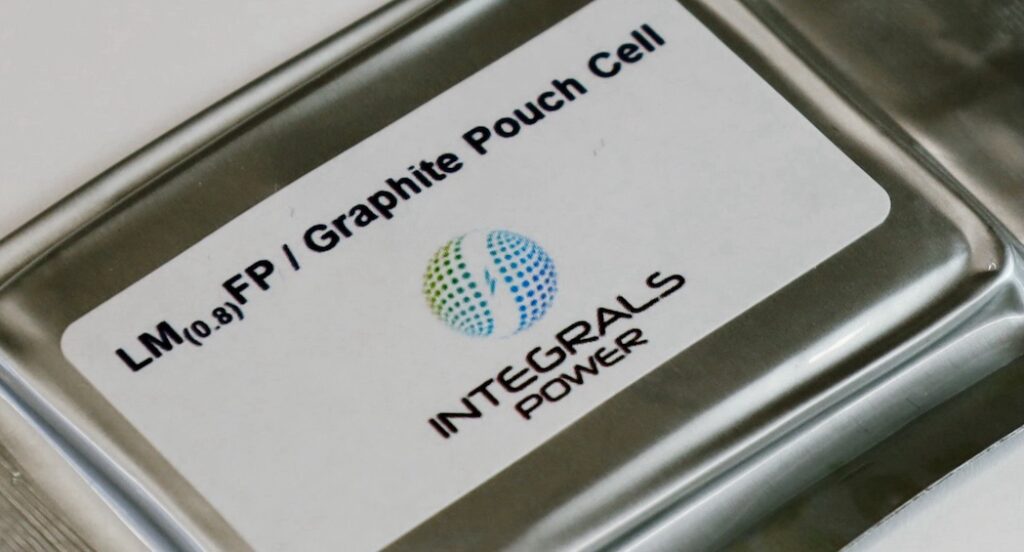
Sign up for daily news updates from CleanTechnica on email. Or follow us on Google News!
The current occupant of the White House is dragging the US back into the dark ages, but progress marches on elsewhere in the world, and it’s a big world out there. Exhibit A is a new lithium-manganese-iron-phosphate EV battery formula from the UK firm Integrals Power, aimed at contributing to the next generation of high performing, lower-costing electric vehicles.
Have A Little LMFP In Your EV Battery
Integrals Power emailed the news to CleanTechnica earlier this week, after recieving validation of its new LMFP EV battery cathode active material from the firm QinetiQ. The tests were conducted on pouch cells deploying graphite anodes and a liquid electrolyte.
“Validated at C-rates [high energy discharge rates] up to an extreme 10C, the tests found that at 5C, the LMFP material retained 92% of its original capacity, and at 2C, 99%,” Integrals explained.
“Even at 10C, which is far beyond the limits of any use case, capacity retention was an impressive 60%,” the company added, noting that QinetiQ was not the only third-party firm to put its LMFP through its paces.
Integrals has been focused on pumping up the proportion of manganese in its formula without losing energy density. Before handing the material over to QinetiQ, Integrals took it to other third-party testing firms and received the thumbs-up for a manganese content of 80%, while leaping the energy density hurdle with the delivery of almost 150 mAh/gr specific capacity.
“As a result, Integrals Power has demonstrated that its LMFP material can be used to make cells that will enable battery packs to deliver an optimal balance of high performance, long range, and long life that exceeds the capability of Lithium Iron Phosphate (LFP) but at less cost and less reliance on critical minerals than Nickel Cobalt Manganese (NCM),” Integrals concluded.
LFP is the cathode material favored by automakers in China due to its relatively low cost, so matching that goalpost with a higher-performing battery is a significant achievement.
Integrals founder and CEO, Behnam Hormozi chipped in his two cents, noting that “we are able to demonstrate to our customers around the world that we can enable significant cost and weight reductions, and more compact, more sustainable, and longer-lasting battery pack designs.”
New EV Battery Is Out For Testing
Integrals is not new to the EV battery field. The company has spent years building up a collaborative network with academic partners and industry stakeholders. Last fall, Reuters reporter Nick Carey reported that Integrals began shipping test samples of both LFP and LMFP cathode materials to EV battery makers and automakers, with three customers in its pocket and 10 more in the pipeline in the US as well as Europe.
“Integrals Power has a small UK pilot production line and aims to have its first industrial scale line operational by 2027,” Carey also noted.
It’s not all on Integrals. The company can potentially license other firms to produce the material as well.
Meanwhile, Back In The USA
As for the future of EV battery manufacturing in the USA, that’s an open question. President Trump’s dopey “Energy Emergency Declaration” includes a carveout for “critical materials.” That covers a wide ground including EV battery materials, which is a hopeful sign.
Or not, as the case may be. In yet another demonstration of idiotic and destructive decision-making at the highest levels of federal energy policy making, on February 7 President Trump ordered a freeze on disbursements from NEVI, the $5 billion federal program that supports state-based EV charging stations programs with funding from the 2021 Bipartisan Infrastructure Law (also called the Infrastructure Investment and Jobs Act).
On the bright side, EV battery stakeholders in the US are not dead yet. After all, many companies long outlast the term of a presidency, so why not lay plans for the future now.
On February 4, for example, the new California firm Elevated Materials celebrated the occasion of its spinoff from Applied Materials. As an independent firm, Elevated will deploy the thin lithium films developed at Applied.
The launch was supported with investments from Applied Materials and the leading financial firm TPG, which lent its Rise Climate fund to the effort.
Elevated’s lithium films are fabricated with roll-to-roll vapor deposition equipment, helping to keep costs down. “Elevated Materials’ advanced lithium films maximize energy density and provide a cost-effective solution for gigawatt-hour scale production,” explains Elevated CEO Jim Cushing.
The film can be used on graphite, silicon, and lithium metal anodes. Elevated foresees applications that will push costs down for electric aircraft, stationary energy storage, and consumer electronics as well as electric vehicles.
If the political environment for EV battery makers in the US becomes even more ridiculous and potentially harmful than it is now, Elevated can always decamp and move to Germany, where it also has offices. BMW, for one, is a fan. In a press statement, Dr. Peter Lamp, a battery expert for BMW Group, noted that Elevated’s lithium thin films are key to overcoming challenges in energy density and anode-specific capacities, such as silicon oxide materials or lithium-metal.”
The EV Battery Market Is Global, Remember?
For that matter, EV battery innovators don’t need the US market, at least not over the short term. The Elevated spin-out is just one example of the global financial forces working to support the energy transition. As tracked by BNEF, clean tech investments are far outstripping fossil energy investments now, and the gap is expected to keep growing.
Take the Rise Climate fund, for example. The $25 billion investing platform notes that it maintains “dedicated pools of capital across private equity, transition infrastructure, and the Global South.”
“TPG Rise Climate pursues climate-related investments that benefit from the diverse skills of TPG’s investing professionals around the world, the strategic relationships and insights developed across TPG’s broad portfolio of climate companies, and a global network of executives, advisors, and corporate partners,” the firm adds.
Rise Climate managing partner Jonathan Garfinkle notes that his firm’s knowledge of the mobility supply chain enables it to “uncover, carve-out, and scale breakthrough technologies like Elevated Materials.”
“We look forward to complementing Applied Materials’ world-class technology expertise with TPG’s business-building capabilities to accelerate and scale this new business to serve the world’s largest battery, auto, and aviation OEMs around the world,” he adds for good measure.
The global energy transition is spending money, creating jobs, and making life on Earth a little healthier, with or without support from the US.
If you’d rather see your tax dollars and other public resources go to support clean tech instead of propping up destructive “energy dominance” bloviating, contact your representatives in Congress and let them know.
Follow me via LinkTree, or @tinamcasey on LinkedIn and Bluesky.
Photo (cropped): Trump or no Trump, the global EV battery supply chain is shifting into high gear as global innovators introduce new materials that cut costs while improving performance (courtesy of Integrals Power, via email to CleanTechnica).
Chip in a few dollars a month to help support independent cleantech coverage that helps to accelerate the cleantech revolution!
Have a tip for CleanTechnica? Want to advertise? Want to suggest a guest for our CleanTech Talk podcast? Contact us here.
Sign up for our daily newsletter for 15 new cleantech stories a day. Or sign up for our weekly one if daily is too frequent.
CleanTechnica uses affiliate links. See our policy here.
CleanTechnica’s Comment Policy

